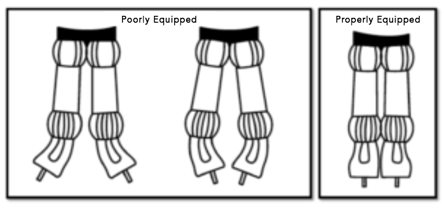
Program Overview
CanSkate is Skate Canada's nationally-recognized flagship program designed for skaters ages 4-15 years of age or who have completed the Pre-CanSkate Program (or have equivalent skills).
It is a dynamic learn-to-skate program that focuses on fun, participation and basic skill development. Based on Sport Canada’s long term athlete development (LTAD) principles, CanSkate centers on physical literacy and the fundamental skills needed to take part in any ice sport or to skate as a recreational activity.
Skaters will learn a complete series of balance, control and agility skills taught in six stages of learning that pertain to hockey, ringette, speed skating and figure skating as well as general recreational skating.
CanSkate uses nationally-tested and proven curriculum and delivery methods that guarantee skater success in developing stronger basic skills and developing them faster.
Coaches make sessions active using teaching aids, upbeat music and a wide variety of activities that create a motivational environment and promote learning and skaters progress at their own rate. Our coaches continuously monitor progress and skills of each skater and will use their discretion to move skaters into the appropriate program.
CanSkaters may graduate to the Cochrane Skating's Club Advanced CanSkate and Junior StarSkate Programs if they are interested in figure skating.
Program Schedule
(Select the Register Button to be taken to the Registration and Pricing Page.)
Fall & Winter
(Sep 2025 to Mar 2026)
Classes are held at Cochrane Arena 609 4 Ave N, Cochrane, AB.
Monday Afternoon Program 3:00 to 3:45 PM:
Fall: Sep 15 to Dec 15, 2025
Winter: Jan 5 to Mar 16, 2026
Tuesday Program 5:15 to 6:00 PM:
Fall: Sep 23 to Dec 9, 2025
Winter: Jan 6 to Mar 17, 2026
Thursday Program 5:15 to 6:00 PM:
Fall: Oct 2 to Dec 4, 2025
Winter: Jan 8 to Mar 19, 2026
Saturday Program 9:00 to 10:00 AM (1 hour):
Fall: Sep 20 to Nov 29, 2025
Winter: Jan 10 to Mar 21, 2026
No classes: Sep 29, Oct 11-13, Oct 20, Nov 10-11, Dec 2, Feb 14-19
Note: Skaters are encouraged to skate 2x per week in CanSkate
Pre-CanSkate and CanSkate Manual 2025-2026
Please refer to the 2025-2026 Manual for parents. This document incudes important information about equipment and what to expect as well as fun theme day events, non skating days and more.
Equipment Requirements
Skaters who are equipped properly will have more fun and will advance faster
1. Skates:
- Skates fit comfortably and there is sufficient ankle support
- There is room for toes to wiggle slightly
- Heels do not lift inside the skate more than ¼ inch
- An adult finger can fit in the top of the boot when done up
- Excess laces are tucked or tied up so that they do not hang loose or drag on the ice.
- We do not recommend the “adjustable or expandable” skates or Molded plastic skates as can hinder skater progress, but either hockey or figure skates options are fine.
2. MANDATORY -- CSA Approved Hockey Helmet:
-
A CSA-approved hockey helmet MUST be worn by all skaters up to and including stage 5 (please click to see Skate Canada Helmet Policy). This means the helmet MUST have the red/blue CSA sticker on it to be valid.
-
This policy will be strictly enforced, please read carefully to avoid disappointment.
-
Bike or snowboard helmets are NOT permitted by Skate Canada and skaters will not be permitted on the ice.
3. Clothing:
- Skaters should dress with warm layers for our sessions; items such as long drawstrings, scarves, dangling coat belts, etc. can be a hazard on the ice and should be removed or avoided.
- Warm mittens or gloves are mandatory and children will not be allowed to skate without them.
Equipment Care:
- To protect the skate blades, skate guards should be worn in any area that is not protected by rubber mats.
- At the end of every session the blades should be wiped with a dry cloth to prevent rusting.
- Skate sharpening should be done periodically, about every 30 hours of skating (depending on usage and care). The bottom pick on figure skates should not be removed – the pick is part of the design and is essential to proper balance.
What happens on the first day?
- Mandatory parent meeting 15 minutes prior to the first class for all parents in the dressing room.
- Collect your skaters name tag and attach to their jacket. Note the coaches will keep it at the end of the class to take attendance.
- Check the monitor in the lobby weekly for the dressing room assigned to CanSkate. Please only use room assigned as other clubs/user groups may have those dressing rooms assigned to them.
- Ensure your child is ready and lined up for the start of the class. Do not allow your skater on the ice until the coach opens the door to the ice.
- Note the first couple of classes are when skaters are grouped and it's normal for skaters to be a bit confused or the session to look hectic. There will be be some switching of groups and adjustments to ensure all skaters are in appropriate groups and skill levels in the first few classes. Coaches may move skaters to different groups throughout the program based on how they progress.
Bottom Content Title
This is an additional section to be able to add content

